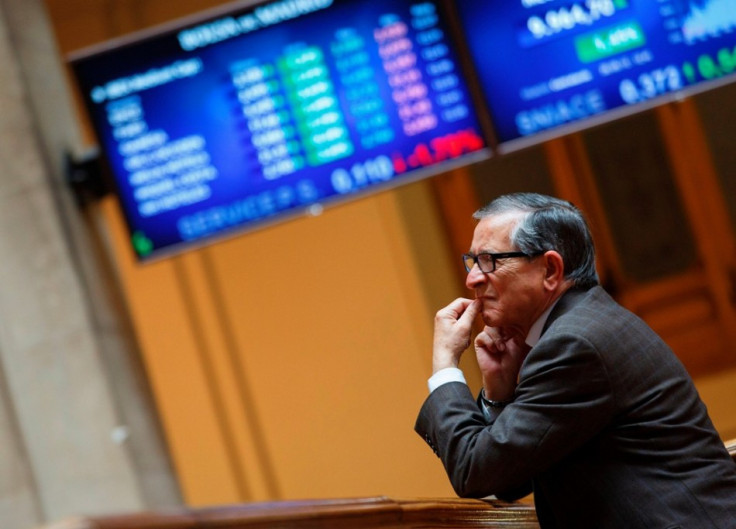European Markets Reverse Early Losses Ahead of Fed Reserve Policy Meet

European markets opened lower on 29 October and traded higher thereafter ahead of the US Federal Reserve's crucial policy-setting meeting.
The Stoxx Europe 600 index opened 0.1% lower to 319.06.
Britain's FTSE 100 opened 0.2% lower.
Germany's DAX 30 and France's CAC 40 opened 0.1% lower
Spain's IBEX 35 was trading 0.18% higher after opening lower.
Italy's FTSE MIB was trading 0.64% higher after opening lower.
Market participants the world over will be tracking the US Federal Reserve's Federal Open Market Committee meeting on 29-30 October for clues as to the future pace of the Fed's asset-buying programme.
The central bank will put out a statement detailing its monetary policy on 30 October. The Fed's $85bn (£52.7bn, €61.6bn) a month bond-buying stimulus has supported the US economy and markets the world over for a while now.
BofA Merrill Lynch Global Research said in a note to clients: "For fiscal policy, the [recent US government] shutdown and persistent uncertainty has led us to shave 0.5ppt each from 4Q and 1Q14 growth, putting them at 2.0% and 2.8%, respectively. After the sharp rebuke from voters and donors in October, we do not expect another shutdown in mid-January."
"Extraordinary measures will postpone the [US] debt limit until at least April, but potentially as late as July. Under these conditions, a rebound in the data could allow the Fed to taper sooner rather than later. The uncertainty around the economic impact of the recent surge in fiscal uncertainty is still large, and the Fed will likely wait until there is more clarity in the November and December data", BofA added.
Standard Chartered said in a note to clients: "Beyond the US government shutdown-induced volatility, US data has been soft, which could further postpone tapering. We still think that the first reduction would be USD 20bn, as the Fed is unlikely to 'tip-toe', drawing on the lessons of the September 'miss'. Tapering could be quick, from the current $85bn to zero over a few meetings. We still think the next QE move will be a reduction not an increase."
The world's most powerful central bank last met in September, when it surprised economists by announcing it would stay the course and not start paring back its massive monthly asset buys.
In the UK, the Bank of England will release a raft of lending data for the months of September and August during the day.
In company news, Finnish mobile phone maker Nokia will release its earnings update during the day.
Oil and gas major BP reported a quarterly underlying replacement cost net profit of $3.692bn (£2.293bn ), beating its own forecast of $3.170bn.
The company increased its quarterly dividend by 5.6% to 9.5 cents per. In addition, the firm said it would sell assets worth $10bn over the next two years, returning most of the proceeds to shareholders
Lloyds Banking Group said its underlying profit nearly doubled to £1.52bn during the September quarter owing to lower costs and an improved interest margin.
Switzerland's biggest bank UBS warned that it may not be able to meet its 2015 profitability goal as the Swiss regulator wants the firm to hold extra capital for risks from litigation.
UBS reported a third-quarter net income of 577m Swiss francs ($644m), beating expectations.
Elsewhere, Deutsche Bank reported a 98% drop in quarterly pre-tax profit to €18m (£15.4m), owing to a €1.2bn jump in litigation provisions and lower trading income.
In Asia and the US
In Asia, the Japanese Nikkei finished 0.49% lower on 29 October. Australia's S&P/ASX finished 0.48% lower and the Shanghai Composite ended 0.23% lower.
However, South Korea's Kospi closed 0.18% higher.
Earlier, markets witnessed mixed trade as investors exercised caution ahead of the Fed's FOMC meeting.
In India, the benchmark index entered positive territory, crossing the psychologically important 20,000 mark after the central bank raised its policy repo rate by 25 basis points to 7.75%, in line with market consensus.
In addition, the RBI rolled back the liquidity tightening measures introduced in July, reducing the Marginal Standing Facility (MSF) rate by 25 basis points to 8.75%. The MSF has been the effective policy rate since July.
"Monetary and fiscal policy cannot both be accommodative at the same time and have inflation where it is. Hence, the RBI has taken on some of the burden. It's telling you that though growth is so weak, they are still tightening essentially because they see fiscal slippage as a potential risk," said Radhika Rao, economist at DBS.
Elsewhere, in South Korea, government data showed that the country's current account surplus fell to a seasonally adjusted $4.97bn in September, from $7.7bn in August.
Earlier, in Australia, the local currency shed 0.6% to 0.9510 to the US dollar following Reserve Bank of Australia (RBA) chief Glenn Stevens' comments.
Speaking at Citi's 5th Annual Australian and New Zealand Investment Conference, Governor Stevens said the Australian dollar remained too high and warned that it would be "materially
On Wall Street, most indices ended marginally lower ahead of the Fed meet.
The Dow finished 1.35 points lower at 15,568.93 on 28 October. The blue-chip index is within 1% of its record high.
The S&P 500 closed 2.34 points higher at 1,762.11, after striking a record high of 1,765.01 in intra-day trading.
The Nasdaq ended 3.23 points lower at 3,940.13.
© Copyright IBTimes 2025. All rights reserved.






















